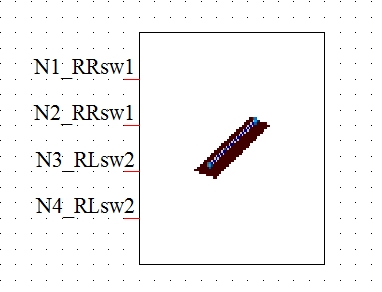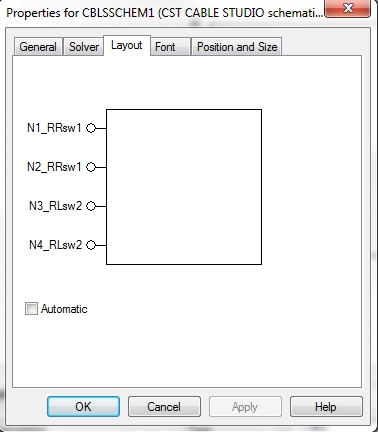Workflow Overview
The basic idea of CST CABLE STUDIO is to have the modeling phase separated
from the actual simulation. Modeling
means the process of generating an equivalent circuit out of the geometric
description of the cable harness. Simulation
means the usage of the equivalent circuit in a network simulation environment.
CST CABLE STUDIO provides a tight interface to CST DESIGN STUDIO to combine
these two separate steps in a comfortable way. After the modeling process
has finished an equivalent circuit is generated, and by changing to the
CST DESIGN STUDIO its schematic block
is displayed in the Main View.
The schematic block comes with the corresponding number of terminals according
to the number of
selected signals (see
Selection):

Re-arranging of terminals
An important pre-processing step is to re-arrange the automatically
generated terminals if the placement does not correspond
to the locations in the geometric representation of the cable, a
reasonable measure in order to avoid wrong loading. The user has to right
mouse click on the schematic symbol and choose
Properties from the pull-down menu. A dialog will appear where
the tab Layout has to be selected:

Using the left mouse button one can simply change the position of the
terminals by drag-and-drop. After the re-arrangement the schematic
block could look like in the figure below:

After the terminals appear in the right order the schematic block can
be loaded by any standard devices which are available in CST DESIGN STUDIO.
The kind of equivalent circuit behind the schematic block, whether it
is prepared for a field solver coupling (see Coupling
to 3D field solver) or not, decides on the possible simulation types
in CST DESIGN STUDIO. If the cable model is not prepared for a field solver
coupling its usage is limited to the circuit domain and the cable's behavior
can be analyzed by different simulation types like (S-Parameters,
AC, Transient).
This is called the standard workflow
for CST CABLE STUDIO. Besides the standard workflow, there are further kinds of field coupling workflows, which assume
a cable model prepared for either uni-
or bi-directional field coupling.
Field Coupled Workflows




